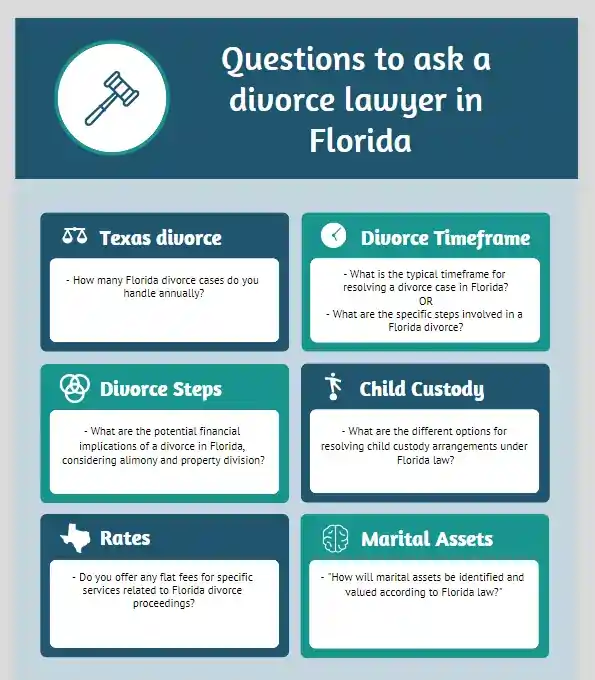15 Questions to ask a divorce lawyer in Florida
Pursuing a divorce in Florida involves handling a unique set of laws and procedures. As you go on this life-changing journey, finding the right legal representation is crucial. A consultation with a knowledgeable Florida divorce lawyer provides an invaluable opportunity to assess their expertise, communication style, and overall approach to your case. By asking insightful, Questions to your divorce lawyer in Florida State during this initial meeting, you can ensure a good lawyer-client fit and increase your chances of a favorable outcome.
Table of Contents
Understanding Your Situation and Goals in Florida
Before your consultation, take the time to reflect on your specific situation, goals, and concerns. Having a clear understanding of what you hope to achieve will help you identify the most pertinent questions to ask. Additionally, make a list of questions to refer to during the meeting, as it’s easy to forget important points when discussing such a personal matter.
Questions to Ask A Divorce Lawyer in Florida
Expertise and Experience in Florida Divorce Law:
– How many Florida divorce cases do you handle annually?
– What percentage of your practice focuses on [your specific legal issue, e.g., child custody, alimony] in Florida?
These questions will help you gauge the lawyer’s familiarity with Florida’s unique divorce laws and their level of expertise in handling cases similar to yours. Experience and specialization are crucial in handling the nuances of your type of case.
The Legal Process and Potential Outcomes in Florida:
Timeline and Process Overview Specific to Florida:
– What is the typical timeframe for resolving a divorce case in Florida?
– What are the specific steps involved in a Florida divorce?
Understanding the timeline and process specific to Florida’s legal system will help you manage your expectations and prepare accordingly. A knowledgeable lawyer should be able to provide a clear roadmap of the divorce process, from filing the initial petition to reaching a final settlement or going to trial.

Potential Outcomes and Risks Considering Florida Law Questions
– What are the different options for resolving child custody arrangements under Florida law?
– What are the potential financial implications of a divorce in Florida, considering alimony and property division?
These questions will shed light on the various outcomes and potential risks involved in your case, considering the nuances of Florida’s divorce laws. A lawyer who can explain the various scenarios and guide you in making informed decisions is invaluable.
Financial Considerations in Florida Divorce Questions
Fee Structure and Billing Practices:
– What is your hourly rate for handling Florida divorce cases?
– Do you offer any flat fees for specific services related to Florida divorce proceedings?
– How will I be billed for court appearances and other expenses?
Transparency about costs will help you budget appropriately and avoid unexpected expenses.
Related Articls For You:
How To Pay For a Divorce Lawyer With No Money?
Find Austin Uncontested Divorce Attorneys for a Smooth Separation
Financial Disclosure and Asset Division in Florida Questions
– “How will marital assets be identified and valued according to Florida law?”
– “How are spousal support (alimony) and child support determined in Florida?”
Understanding the process of financial disclosure and asset division according to Florida’s specific laws is crucial for a fair settlement. A lawyer who is thorough and experienced in these matters can help ensure an equitable division of assets and appropriate support arrangements.
Additional Considerations Specific to Florida Questions
Building Trust and Rapport with a Florida Divorce Lawyer:
– What is your experience handling Florida divorce cases similar to mine?
– How do you keep your clients informed about updates to Florida divorce law?
Finding a lawyer with extensive experience in Florida divorce cases and a commitment to keeping clients informed about legal updates can make a significant difference. A lawyer who takes the time to understand your unique circumstances and shares a compatible approach can make the process smoother and more comfortable.

Alternatives to Litigation in Florida Questions
– Are you familiar with Florida’s mediation process for divorce?
– What are the benefits of using alternative dispute resolution methods in Florida divorces?
Exploring alternatives to traditional litigation, such as mediation or collaborative divorce, can potentially lead to a more amicable and cost-effective resolution. A lawyer who is open to these options may be able to help you achieve a resolution more efficiently and with less conflict.
Conclusion
Asking Florida-specific questions during your divorce lawyer consultation is crucial to ensuring you find the right legal representation for your unique situation. Take notes, and don’t hesitate to follow up with any additional questions that arise after the consultation.
Remember, you are entrusting this professional with a deeply personal and often emotionally charged matter. Finding a lawyer experienced in Florida divorce law who you feel comfortable with and confident in can make a world of difference. With the right representation, you can navigate this challenging chapter with greater clarity, peace of mind, and a favorable outcome.
Related Articls For You:
How the 5-Year Rule Affects Your Rights In CA?
Divorcing Because of Mother in Law
15 Questions to ask a divorce lawyer in Florida
FAQs
1. What are the residency requirements for filing for divorce in Florida?
Answer: To file for divorce in Florida, at least one spouse must have been a resident of the state for at least six months before filing.
2. What are the grounds for divorce in Florida?
Answer: Florida is a no-fault divorce state, meaning that neither party needs to prove fault or wrongdoing. The legal grounds for divorce in Florida are either irretrievable breakdown of the marriage or mental incapacity of one spouse.
3. How is child custody determined in Florida divorces?
Answer: Florida courts prioritize the best interests of the child when determining custody arrangements. Factors considered include the child’s relationship with each parent, the parents’ ability to provide a stable environment, and any history of domestic violence or substance abuse.
4. What are the tax implications of alimony and child support in Florida?
Answer: In Florida, alimony payments are generally deductible for the payer and taxable income for the recipient, while child support payments are neither deductible nor taxable.
5. What resources are available for low-income individuals seeking a divorce in Florida?
Answer: Florida offers legal aid services through organizations like Florida Rural Legal Services and legal clinics at law schools. Some lawyers may also offer sliding-scale fees or payment plans based on income.
By being prepared and asking the right questions specific to Florida’s divorce laws and procedures, you can make an informed decision when selecting a divorce lawyer to represent you during this challenging transition. With the right legal guidance, you can navigate the process with confidence and protect your best interests every step of the way.
About the Author

Sarah Klein, JD, is a former family law attorney with over a decade of courtroom and mediation experience. She has represented clients in divorce, custody cases, adoption, Alimony, and domestic violence cases across multiple U.S. jurisdictions.
At All About Lawyer, Sarah now uses her deep legal background to create easy-to-understand guides that help families navigate the legal system with clarity and confidence.
Every article is based on her real-world legal experience and reviewed to reflect current laws.
Read more about Sarah
About the Author

Sarah Klein, JD, is a licensed attorney and legal content strategist with over 12 years of experience across civil, criminal, family, and regulatory law. At All About Lawyer, she covers a wide range of legal topics — from high-profile lawsuits and courtroom stories to state traffic laws and everyday legal questions — all with a focus on accuracy, clarity, and public understanding.
Her writing blends real legal insight with plain-English explanations, helping readers stay informed and legally aware.
Read more about Sarah
